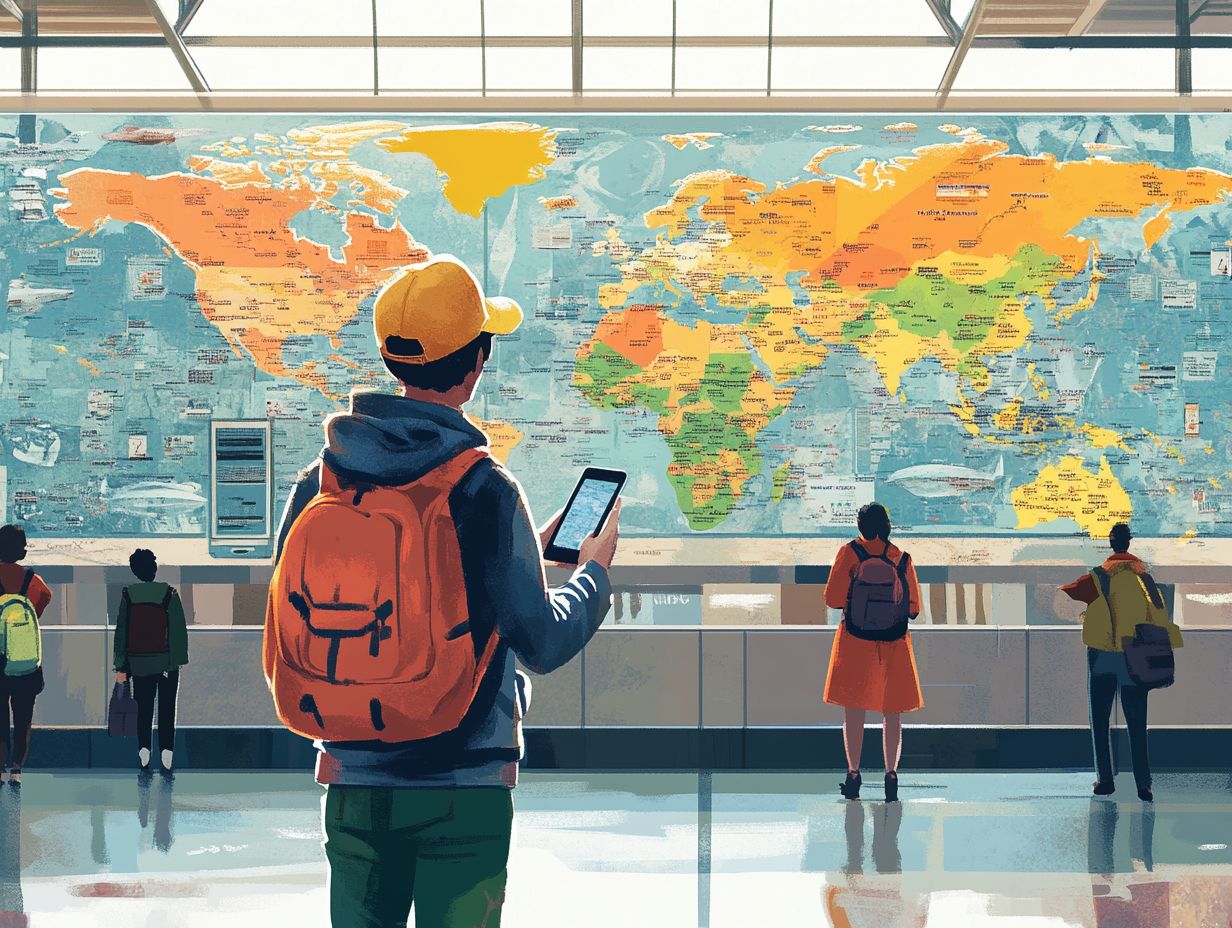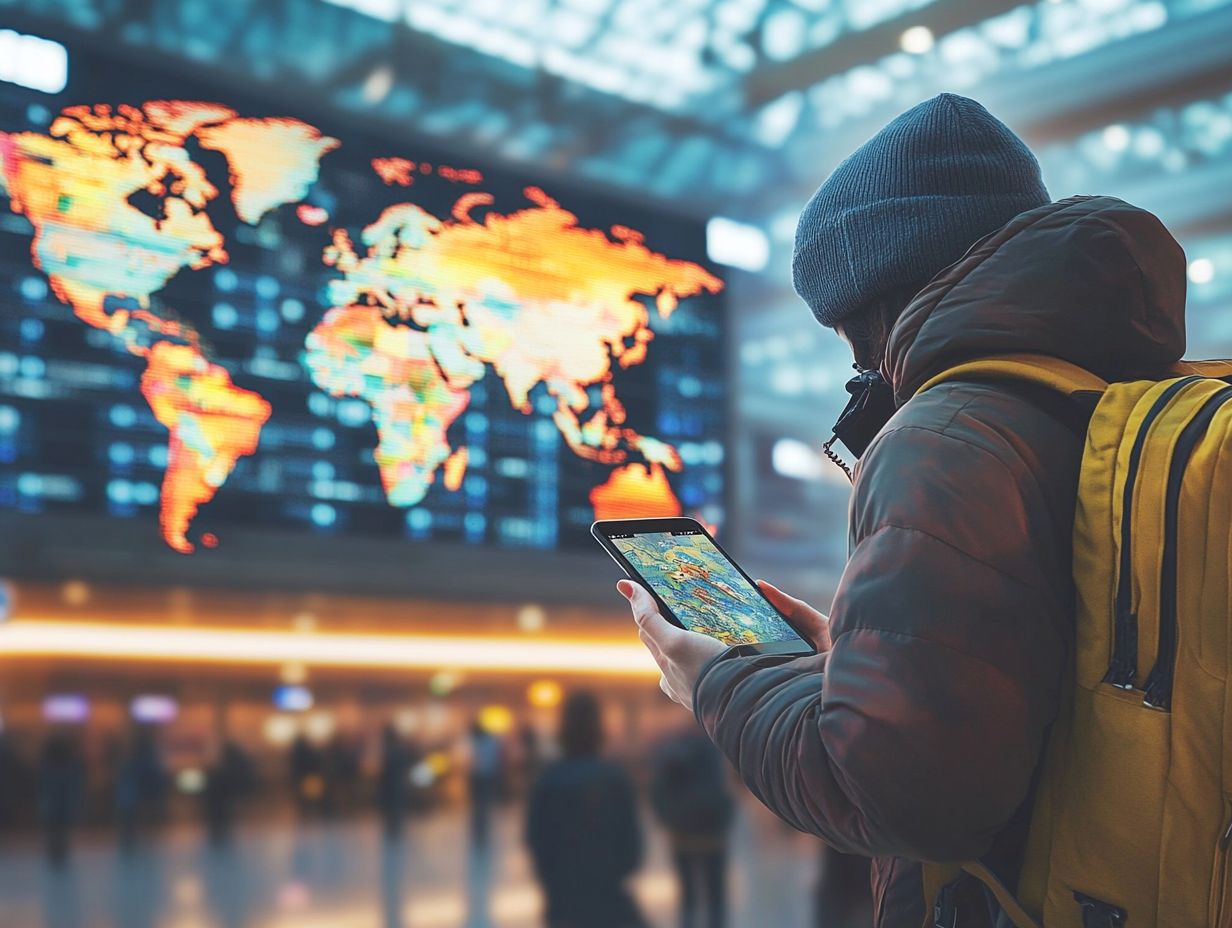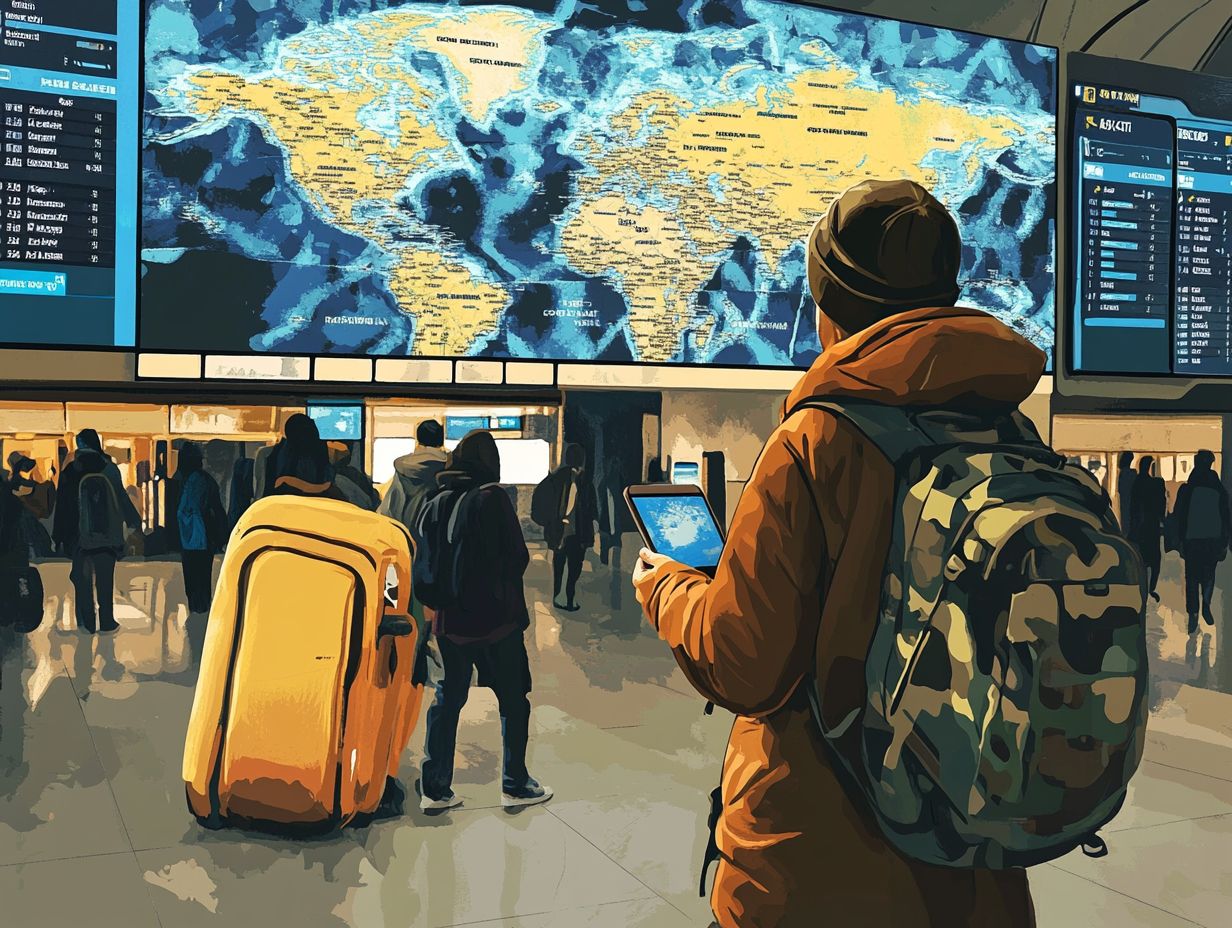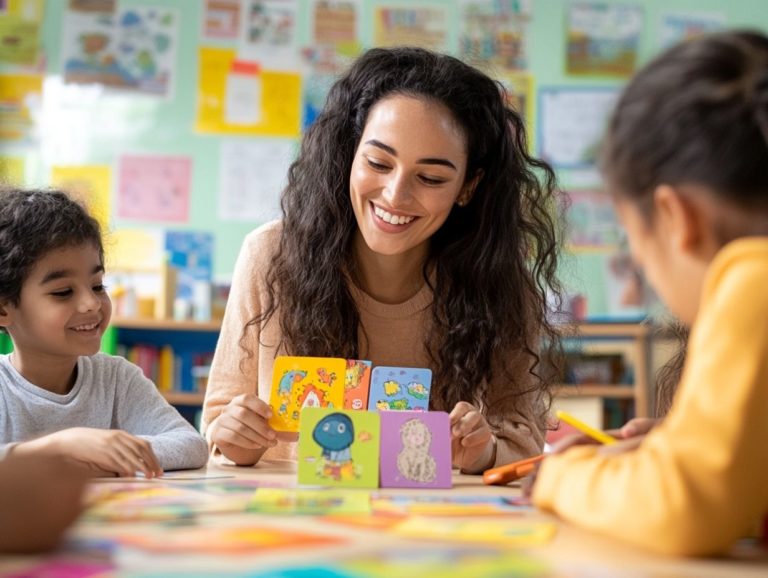5 Useful Phrases for Traveling Abroad
Traveling abroad can be an exhilarating experience, yet it often presents its own set of challenges, particularly in communication.
Knowing a few essential phrases can transform potential frustrations into seamless interactions. This article reveals five must-know phrases that will empower you to find your way around, discover local dining options, and seek assistance when necessary.
It also covers effective tips for learning basic phrases, interpreting gestures, and adapting to local customs, ensuring you feel confident and connected throughout your travels.
Contents
- Key Takeaways:
- 1. “Where is the nearest bathroom?”
- 2. “Can you recommend a good local restaurant?”
- 3. “How do I get to [specific location] from here?”
- 4. “Do you speak English?”
- 5. “How much does this cost?”
- What Are the Essential Phrases to Know When Traveling Abroad?
- How Can One Learn Basic Phrases in the Local Language?
- What Are the Common Gestures and Body Language to Be Aware of?
- How Can One Ask for Help or Assistance in a Foreign Country?
- What Are the Cultural Norms and Customs to Be Mindful of?
- How Can One Communicate Effectively in a Language Barrier Situation?
- Frequently Asked Questions
Key Takeaways:
Here are some crucial tips for your journey:
- Always know how to ask for a bathroom in the local language when traveling abroad.
- Getting recommendations for local restaurants can enhance your travel experience.
- Being able to ask for directions to a specific location is key when navigating a foreign country.

1. “Where is the nearest bathroom?”
When you re exploring a new city or country, knowing essential travel phrases like “Where is the nearest bathroom?” can truly elevate your travel experience. It facilitates effective communication with locals and eases any discomfort during your adventure.
Being familiar with a few key phrases can significantly reduce stress, especially during emergencies. For instance, knowing how to say “Help!” can be vital, while phrases like “I need a doctor” or “Do you speak English?” can be lifesavers.
In Spanish, saying ” D nde est el ba o m s cercano?” or “Necesito ayuda” helps you connect with local speakers. In French, “O sont les toilettes ?” or “J ai besoin d aide” does the same.
Mastering these phrases not only boosts your confidence but also fosters a sense of safety as you navigate unfamiliar territories.
2. “Can you recommend a good local restaurant?”
Asking locals, “Can you recommend a good local restaurant?” is more than just a dining inquiry; it s your gateway to experiencing the vibrant culinary culture of your destination. It s a way to connect with the community and savor authentic flavors.
This simple phrase unlocks a treasure trove of gastronomic delights that might otherwise remain hidden. When seeking recommendations, express genuine curiosity and appreciation for the local cuisine, which encourages more engaged responses.
Variations like ” Me puedes recomendar un buen restaurante local?” in Spanish or “Puoi consigliarmi un buon ristorante locale?” in Italian can elevate your interactions, making conversations feel personal and respectful.
By embracing these dining phrases, you not only expand your palate but also immerse yourself deeper into the culture, creating connections that lead to unforgettable memories.
3. “How do I get to [specific location] from here?”
Understanding how to navigate your surroundings is essential. Asking, “How do I get to [specific location] from here?” provides clarity about transportation options and insights into local bus and train services.
This simple question elevates your travel experience and bolsters your confidence in unfamiliar environments.
Imagine finding yourself in a bustling city; asking, ” C mo llego a [destination]?” in Spanish or “Comment puis-je me rendre [destination]?” in French could unlock valuable advice from locals.
Utilizing transportation apps can further streamline your journey. Tools like Google Maps or Citymapper provide real-time transit information, allowing you to compare various routes and modes of transport.
Don t forget to check if these apps support offline access this feature can be a lifesaver in areas with limited connectivity. Equipping yourself with both essential phrases and cutting-edge technology enriches your travel adventures and simplifies navigation, making every journey more enjoyable.
Start practicing these phrases today and make your next trip unforgettable!
4. “Do you speak English?”

The question Do you speak English? is your golden ticket as a traveler. It serves as a vital inquiry that bridges communication gaps and enriches interactions with locals. This ultimately enhances your overall travel experience.
This simple question helps you chat easily and opens the door to a deeper understanding of local customs and traditions.
For example, in cultures where English isn t the norm, asking if someone speaks English can lead to more meaningful exchanges. In Germany, you might say, Sprechen Sie Englisch? In Spain, you can ask, Habla ingl s?
These adaptations show the importance of respectful communication and your willingness to engage with the local language. This fosters goodwill and connection with the residents you meet along your journey.
5. “How much does this cost?”
When you venture into local markets or enjoy dining experiences, knowing how to ask, “How much does this cost?” is essential for managing your budget while traveling. This skill allows you to engage thoughtfully in shopping and culinary adventures without overspending.
Understanding local pricing customs can elevate your financial savvy. Cultural attitudes toward negotiation can vary significantly. In some regions, haggling is welcomed, while in others, prices are fixed, with discounts being rare.
Learning key phrases like ” Cu nto cuesta?” in Spanish or “Combien a co te ?” in French can enhance your ability to communicate effectively. Using expressions like “Do you have a discount?” or “Allez-vous faire un rabais ?” in French can lead to better deals, making budgeting a rewarding part of your travels.
What Are the Essential Phrases to Know When Traveling Abroad?
When embarking on a gap year or any international travel adventure, mastering essential phrases can dramatically elevate your experiences. This skill enables you to navigate diverse cultures, engage with locals, and immerse yourself in transformative cultural encounters.
Your preparation should include practicing phrases related to accommodations, dining etiquette, transportation options, and emergency contacts. A solid vocabulary in these areas helps you book accommodations, order meals with confidence, and navigate public transit effortlessly.
You have access to countless resources, such as online language platforms like Duolingo and Memrise. These offer engaging exercises and practical vocabulary tailored to real-life situations. These tools make learning interactive and encourage daily practice, enhancing your ability to communicate effectively while abroad.
How Can One Learn Basic Phrases in the Local Language?
Learning basic phrases in the local language whether Spanish, French, or Italian can elevate your travel experience. It offers a unique opportunity to connect with locals and navigate various situations with ease.
When you master these essential phrases, you unlock the potential for authentic interactions that make your journey more rewarding. Explore different learning methods; online language courses can be incredibly valuable.
Platforms like Duolingo and Memrise provide engaging ways to grasp vocabulary and grammar essentials. Practicing these phrases in conversation with native speakers or language exchange partners can significantly boost your confidence.
If perfecting your pronunciation is a goal, watching language tutorials on YouTube is a fantastic resource. These videos offer visual and auditory cues that enhance your understanding and retention.
With dedication, you can enrich your travel adventures through the power of language. Start learning phrases today and dive into the local culture!
What Are the Common Gestures and Body Language to Be Aware of?

Understanding common gestures and body language is just as essential as mastering those spoken travel phrases. These non-verbal cues often convey crucial information about local customs and etiquette, significantly enhancing your ability to connect meaningfully with others during your journeys.
For example, while a thumbs-up might signal approval in many Western cultures, it can be quite offensive in places like Greece or parts of the Middle East. Similarly, maintaining eye contact may denote confidence and honesty in some countries, but in others, it could come off as disrespectful or aggressive.
Navigating these nuances can truly make or break your interactions. When asking for directions, a warm smile and a nod can work wonders. Misinterpreting a casual hand wave could lead to confusion.
By cultivating a keen awareness of body language, you not only foster successful communication but also develop a deeper appreciation for the rich tapestry of cultures you encounter.
How Can One Ask for Help or Assistance in a Foreign Country?
In foreign countries, knowing how to ask for help can truly be a lifesaver! Phrases like “Can you help me?” or “I need assistance, please” are essential tools that ensure you get the support you need while navigating unfamiliar environments or dealing with emergencies.
Understanding expressions such as “Where is the nearest hospital?” or “I have lost my wallet” becomes crucial in urgent situations. Approaching locals with a friendly smile and employing simple gestures can bridge communication gaps, even in the face of language barriers.
Stay calm and polite! This can make a huge difference. A respectful demeanor often inspires a more willing response from strangers.
When seeking help, remember to speak slowly and clearly this can make a significant difference, allowing others to understand your needs more effectively.
Emphasizing patience in these scenarios will guide you toward a smoother resolution.
What Are the Cultural Norms and Customs to Be Mindful of?
Being mindful of cultural norms and customs can significantly elevate your travel experiences. Understanding local etiquette like greetings, dining manners, and social interactions helps you avoid misunderstandings and fosters deeper connections with the communities you visit.
Take Japan, for example. Bowing isn t just a casual gesture; it s a profound sign of respect, with the depth of the bow conveys different levels of formality. In contrast, Italy welcomes a firm handshake as a standard greeting, while cheek kissing among friends radiates warmth and familiarity.
In many Middle Eastern cultures, using the right hand for eating and offering is crucial, as the left hand is considered unclean. By being adaptable and showing respect for these customs, you not only enrich your own travel experiences but also positively influence your interactions, paving the way for meaningful connections.
How Can One Communicate Effectively in a Language Barrier Situation?
Navigating situations where language barriers exist demands a mix of good communication skills, patience, and a touch of creativity. You can utilize gestures, jot down key phrases, and employ translation tools like Google Translate to facilitate smoother interactions and mitigate misunderstandings.
It s also important to listen actively and observe non-verbal cues, as body language often conveys emotions and intentions far more powerfully than words can. Encouraging the other party to express themselves through drawings or visual aids can further bridge the gap in understanding, making communication feel less daunting.
By suggesting the use of simple, clear language, you can minimize confusion. Taking breaks during conversations allows both sides to process information more effectively.
Embracing these techniques can transform challenging situations into opportunities for meaningful exchange, fostering connections that transcend linguistic limitations.
Frequently Asked Questions

What are the top 5 useful phrases for traveling abroad?
The top 5 useful phrases for traveling abroad are “hello,” “thank you,” “please,” “excuse me,” and “where is the bathroom?” These phrases help you navigate, show gratitude, and communicate respectfully with locals.
Why learn useful phrases before traveling?
Learning these phrases shows respect for local culture. It also enhances your travel experience and helps you connect with the destination.
How to practice and remember these phrases?
To remember these phrases, write them down and practice in conversations. Use language learning apps apps that help you learn a new language on your phone or take a course before your trip.
Cultural considerations when using these phrases?
Yes, culture matters! In some places, saying “no” directly can be rude. Use alternatives like “maybe” or “I’ll think about it.” Pay attention to the level of formality too.
What if I mispronounce a phrase?
If you mispronounce, don t stress! Locals appreciate your effort. Ask them to correct you and try again. Most people are happy to help!
Can these phrases be used in any country?
These phrases work in many countries, but some have unique variations. Research local languages and customs before your trip to learn useful phrases specific to your destination.






